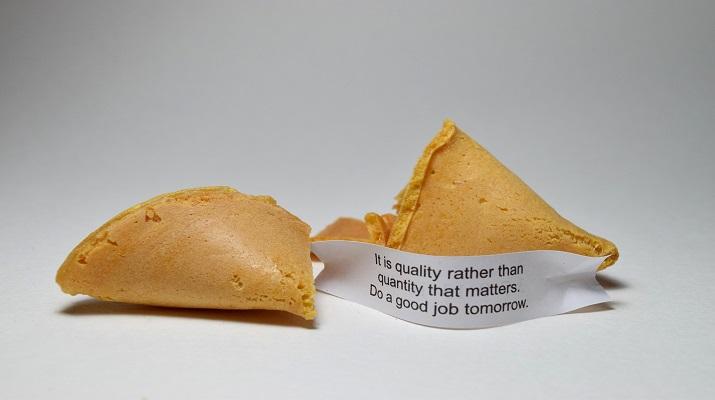The Ultimate Fortune Teller?

Pictured above is a fortune cookie. If you’re in the United States, you’re probably familiar with them; you get them from Chinese restaurants whenever you go there for a meal or order takeout. They’re not very common in the rest of the world, though — some Chinese places in Canada, Mexico, South America, and the UK will have them, but it’s hit or miss. Everywhere else, they’re basically unheard of. If you’re not familiar with them, fortune cookies are crisp, slightly sweet wafers folded into little crescent-shaped pouches. They’re made from flour, sugar, vanilla, and a little bit of sesame oil, and usually aren’t thought of as a culinary delight. What makes them fun is the inedible part — a little piece of paper inside that shares an aphorism, some words of wisdom, or a fortune. Each diner takes a cookie, cracks it open, and reads their fortune, ideally aloud so everyone can share in the experience of thinking about something you weren’t previously thinking about.
But the fun is diminished if two people at the same meal get a repeat. Fortunes are supposed to feel personal, even though we know better. And if you and your friend get the same fortune? That magic disappears. So, to account for this problem, fortune cookie manufacturers must come up with many different fortunes.
And until 2017, the person writing those fortunes was probably a man named Donald Lau.
Lau works for Wonton Food, Inc., the world’s largest manufacturer of fortune cookies. They make approximately 4.5 million such cookies per day, which comes out to about 1.5 billion per year. And that accounts for approximately half of all the fortune cookies baked by all manufacturers in a year, so there’s a 50/50 chance that your fortune cookie is from Wonton Food. That wasn’t always the case, though. Wonton Food makes a lot of other staples found at Chinese restaurants — noodles, crispy noodles, egg roll wrappers, egg roll filling, and bean sprouts. It wasn’t until the mid-1980s that they got into the fortune cookie business; around then, Wonton Food acquired some fortune cookie manufacturers and then scaled up production significantly. And at the time, they didn’t have a Chief Fortune Cookie Writer — so the Chief Financial Officer, Donald Lau, picked up the slack.
That’s not an obvious role for a person whose job is to deal with numbers, but sometimes, you have to make do with what you have. According to CNN, “Lau says the job [of writing fortunes, not of managing the finances] was given to him by default because he spoke the best English when the company was founded.” And he turned out to be well-suited to handle the task. Per CNN, Lau “[found] inspiration from all aspects of life, from taking the subway to participating in business meetings,” and for most of his 30-year tenure as a cookie scribe, “Lau used to write two or three axioms a day,” giving credibility to his claim of being “the most read author in the United States” But in 2016, his output slowed down a lot: citing both writer’s block and the company’s growth — his focus had to shift more to the finances — Lau was only able to crank out two or three new messages per month.
So in 2017, Lau handed the reins to James Wong, an assistant vice president at the company whose other duties, if any, have gone unreported. Today, Wong is the one writing all the messages in those cookies, and it’s hard to fill Lau’s shoes — so hard, in fact, that Wong’s drafts now go through a vetting committee. As Wong told CBC Radio, the trick to writing a good fortune cookie fortune is to make sure you don’t accidentally offend the diner, and sometimes, it’s hard for a solo contributor to make sure there are no oversights. For example, Wong told the CBC, “a middle-aged couple was having dinner before the man was supposed to go off to a business trip, and the fortune that he received was, ‘Romance is in the air for your next trip.’ That definitely was not a good thing.” The couple eventually divorced, and the wife blamed Wonton Food for the irreconcilable differences, to the point where she had her lawyer contact the food manufacturer.
Not all fortune cookies end up in such comedy or tragedy (depending on your point of view). But in any event, breaking up marriages isn’t the goal or hallmark of a good fortune cookie. The simple wisdom behind a fortune cookie is best summed up by Lau himself, who explained it to the New York Post, “when they eat their fortune cookie, I want the customers to open the fortune, read it, maybe laugh, and leave the restaurant happy so that they come back again next week,”
Bonus fact: When Chinese basketball superstar Yao Ming came to play in the United States for the NBA’s Houston Rockets, teams across the league tried to leverage his star appeal to bring fans to the game — and sometimes, in ways that at best lacked cultural sensitivity. For example, according to ESPN, “the Miami Heat held a Fortune Cookie Night — another Asian stereotype — for Yao’s first trip to Miami in 2002.” That probably was inappropriate, but it’s quite possible Ming had no idea what the promotion was about. Fortune cookies are an American creation of Japanese origin, and as ESPN further notes, “Yao had never seen a fortune cookie in China.”
From the Archives: The Luckiest Dessert in History: The fortune cookies that made a lot of people a little rich — and set off a bunch of fraud alerts.
